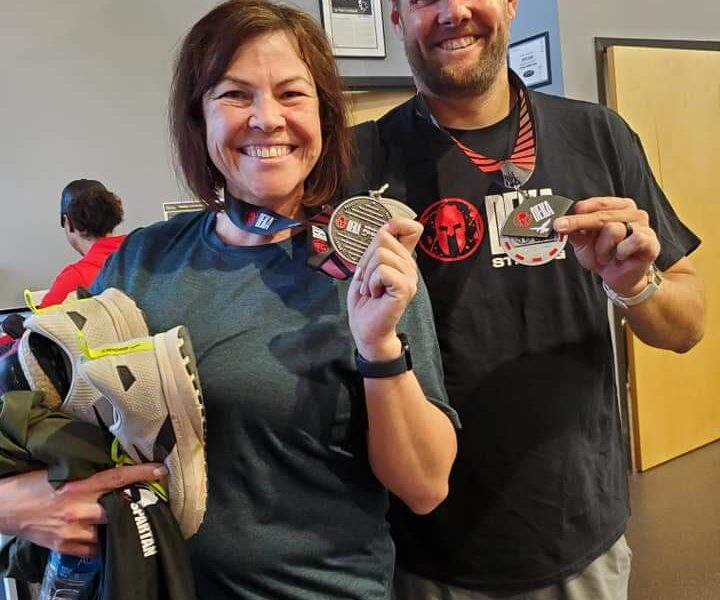DEKA is The Decathlon of Functional Fitness. It consists of indoor fitness competitions and motivational training programs designed for ALL levels. Take your OCR game to a whole new level and embrace the DEKA challenge. Sign up for our first DEKA event NOW. It’s YOU vs. YOU … What will be your DEKA score? #DEKA. More locations to follow.
The concept was simple: Create a fitness benchmark that could be tested in a controlled environment so that any person — or any team — could walk away knowing exactly where they stood in reference to others. An event that was not prohibitive of ability and not influenced by location or terrain, and was designed to challenge both elite athletes and weekend warriors. A concept that encapsulated all the tenets of Spartan — grit, determination, and perseverance — in one arena. Five-thousand meters of running; 10 stations testing strength, endurance, and mobility; no hesitation.
Welcome to DEKA.
Yancy Culp, DEKA’s Sport Development Program Manager, gave us insight into the new Spartan endeavor that will deliver it all.
The event was inspired by antiquity.
For everything DEKA, including workouts and tips, click here.
“From a historical perspective, all motion was designed for survival: It was all about providing for ourselves, our families, and our tribe,” Culp said. “Strength, agility, movement, endurance: These were essential to surviving, and the ancient Greeks were the first to transition them into exercise and put them into a competition. But even that word ‘compete,’ with the Latin roots including ‘com’ (‘come together’) and ‘compere’ (‘strive and seek’), revealed it wasn’t just about going for victory.
“The ancient Greeks believed in Arete, the idea of excellence in a sound body and mind. In working toward that excellence, a person would benefit and the community would benefit.”
To test this, the ancient Greeks developed various events contested by one person that would be measured and scored separately across a variety of venues. Traditionally including throwing, jumping, sprinting, and hurdling, athletes spent their entire lives mastering the intricacies of every movement in preparation.
“Even today, there are other competitions that claim to test the total athlete, but those competitions frequently target specific events or movements, and we wanted something that was straightforward and accessible to any range of fitness,” Culp said. “The Greeks developed rudimentary events, and DEKA isn’t going to replace those other formats. Instead, it will complement them. It’s all on the same plane: a method of testing for the masses, not just specialization.
“We wanted something that any gym or any group could show up and do, from mom and pop local gyms to the armed forces and first responders.”
The method became the most important part. So how does DEKA work?
The venue will be enclosed (the DEKA Arena), where competitors and spectators alike will not be bothered by terrain or natural interference. Everything will be standardized indoors and climate-controlled.
A running track will form the perimeter of the DEKA Gym. Runners will run intervals of 1.5 laps, for the start of their entry and in between each zone.
Ten fitness stations, known as DEKA Zones, will test all manner of strength, endurance, balance, coordination, and mobility inside the DEKA Gym.
Five DEKA Zones will use exercises that would give a level of resistance for participants (scored by completion time), and the other five zones will use weighted implements and a prescribed number of reps.
Overall time will be measured as a DEKA Mark (creating the DEKA Score), which will encompass 21 individual splits: 10 laps of 500 meters, the 10 individual zones, and a zone transition time.
Competitors will enter the competition in tiered waves of 20 individuals at a time.
The goal is to evaluate these metrics so literally anyone can be measured in DEKA at any point, without the discrepancies or technicalities found in other formats.
“We want to be able to pull 1,000 people off the street to show they can test themselves that same day and measure it for that day and for the future,” Culp said. “We want HR departments to have their employees earn a DEKA Mark. We want there to be classifications for individuals from all backgrounds, to be shown in comparison with the best co-ed teams or elite participants. All that’s required is a good pair of running shoes. In fact, that’s just a recommendation.
“We feel it’s very important to test all levels of fitness and get an accurate DEKA Score, for the same arena and same day, and with the same standards. All levels of fitness deserve a mark. This puts a lot of wind under the wings of every fitness movement, for any location or level of involvement. It doesn’t matter the size of the gym or membership, whether it’s trainers, owners, or casual fitness users. Everyone can achieve a mark.”
Plus, athletes don’t need a classification to train for DEKA.
“You could literally come from urban environments or the country or anything in between,” Culp said. “You and I could train for this in our backyard, our living room, or any gym in the world. You don’t need anything fancy to get better. This is the most basic form of work, and you can train for this year-round, without a budget. It’s for any group in business or in sport; schools, armed forces. Literally ANYONE. There’s no limit for growth.”


